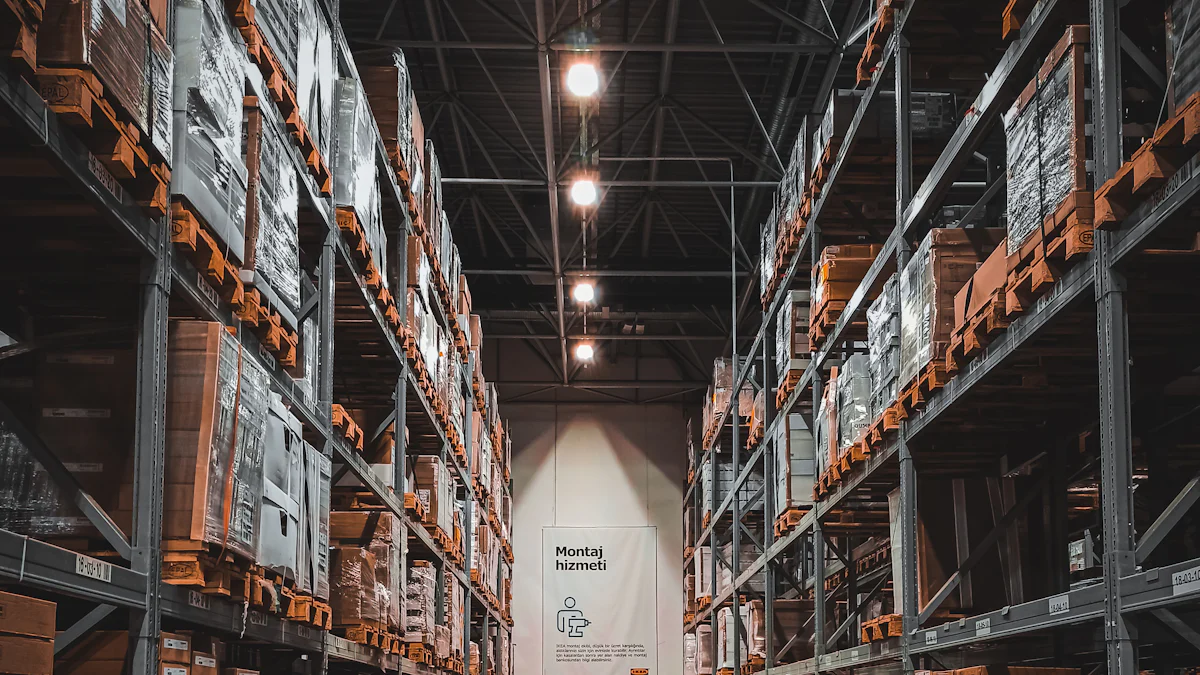Enhancing Logistics Efficiency Through Strategic Sourcing

Logistics efficiency drives the logistics industry, valued at $8.96 trillion in 2023 and projected to reach $15.79 trillion by 2028. Strategic sourcing transforms supply chain management by enhancing supplier reliability and reducing risks. JUSDA’s innovative solutions for strategic sourcing, like JUSDA ESG, integrate automation and sustainability to optimize operations and improve efficiency.
Key Takeaways
Strategic sourcing aims for lasting value and teamwork with suppliers. It helps make logistics better and lowers costs.
Good supplier relationships are key for smart sourcing. They bring better quality, dependability, and new ideas.
Using technology and data can make buying easier. It helps with better choices and shows the supply chain clearly.
Understanding Strategic Sourcing in the Logistics Industry

Definition and Core Principles of Strategic Sourcing
Strategic sourcing is a proactive approach to procurement that focuses on building long-term value and aligning sourcing strategies with business goals. Unlike traditional methods, it emphasizes collaboration with suppliers to optimize costs, improve quality, and enhance supply chain efficiency. In the logistics industry, strategic sourcing plays a pivotal role in addressing challenges like rising costs, demand fluctuations, and sustainability requirements.
The core principles of strategic sourcing guide its implementation. These principles include cost reduction, quality improvement, efficiency, risk mitigation, and sustainability. The table below outlines these principles in detail:
Core Principle | Description |
|---|---|
Cost Reduction | Negotiating better prices with suppliers to save on procurement spend. |
Quality Improvement | Collaborating with suppliers to enhance product and service quality, reducing defects and recalls. |
Efficiency | Streamlining the procurement process to allocate resources more effectively. |
Risk Mitigation | Diversifying the supplier base and fostering strong relationships to minimize exposure to risks. |
Sustainability | Partnering with suppliers to implement sustainable practices and reduce environmental impact. |
Strategic Sourcing vs. Traditional Procurement in Supply Chain Management
Strategic sourcing differs significantly from traditional procurement. While traditional procurement focuses on short-term cost savings and immediate needs, strategic sourcing prioritizes long-term value and operational efficiency. It evaluates suppliers based on reliability, innovation, and quality rather than just price. This approach fosters partnerships that help businesses navigate challenges and seize opportunities.
Key differences include:
Strategic sourcing creates partnerships with suppliers, while traditional procurement often relies on transactional relationships.
It leverages data-driven insights and automation, whereas traditional methods depend on manual processes.
Strategic sourcing aligns with broader business objectives, unlike traditional procurement, which addresses immediate requirements.
By adopting strategic sourcing in the supply chain, you can achieve greater cost-effectiveness and resilience.
The Importance of Supplier Management in Strategic Sourcing
Effective supplier management is the backbone of strategic sourcing. Building strong relationships with suppliers ensures consistent cost savings, enhances supply chain efficiency, and fosters innovation. By collaborating with suppliers, you can mitigate risks, negotiate better terms, and improve product quality.
To optimize supplier management, focus on nurturing partnerships rather than treating suppliers as transactional entities. Conduct comprehensive market research and analyze the total cost of ownership to make informed decisions. Cross-functional teams with expertise in procurement and risk management can further strengthen supplier relationships. This collaborative approach ensures timely delivery, reduces costs, and drives continuous improvement in supply chain operations.
Key Challenges in Logistics Efficiency Addressed by Strategic Sourcing
Managing Rising Costs in the Logistics Industry
Rising costs remain one of the most pressing issues in the logistics industry. Strategic sourcing helps you address these challenges by optimizing procurement processes and fostering cost-effective supplier relationships. Several factors contribute to escalating expenses:
Insufficient infrastructure disrupts operations and extends delivery times.
Complex regulations create administrative burdens and delays.
Urban congestion inflates last-mile delivery expenses.
Investments in advanced technologies demand significant resources.
By implementing strategic sourcing, you can negotiate better terms with suppliers and identify cost-saving opportunities. This approach ensures that your logistics management remains efficient and financially sustainable.
Ensuring Supplier Reliability and Mitigating Risks
Supplier reliability is critical for maintaining seamless logistics operations. Strategic sourcing emphasizes building strong relationships with suppliers to ensure consistent performance. You can mitigate risks by:
Diversifying your supplier base to reduce dependency.
Improving inventory management through accurate demand forecasting.
For example, contingency planning involves identifying alternative suppliers and transport methods, enabling you to adapt quickly to unforeseen events. Regular communication and performance evaluations further strengthen supplier reliability, ensuring high-quality service delivery.
Addressing Demand Fluctuations and Supply Chain Disruptions
Demand fluctuations and supply chain disruptions challenge logistics management. Strategic sourcing leverages technology to enhance adaptability. Automation reduces labor dependency, while tools like autonomous mobile robots (AMRs) efficiently handle volume spikes. During the COVID pandemic, AMRs proved invaluable in managing sudden demand surges without increasing workforce requirements. By integrating predictive analytics, you can forecast demand accurately and align sourcing strategies with market needs.
Promoting Sustainability and Ethical Sourcing Practices
Sustainability has become a cornerstone of modern logistics. Strategic sourcing enables you to align procurement with ethical and environmental goals. Companies like IKEA exemplify this by implementing frameworks that prioritize responsible sourcing and waste reduction. Long-term benefits include operational cost savings, enhanced supply chain resilience, and stronger customer loyalty. For instance, sustainable sourcing programs can reduce operating costs by $60 million while improving profit margins. By adopting these practices, you not only meet consumer expectations but also contribute to a greener future.
Actionable Strategies for Implementing Strategic Sourcing
Leveraging Technology and Data Analytics with JUSDA ESG
Technology plays a pivotal role in strategic sourcing by enhancing efficiency and visibility across the supply chain. Tools like automated supplier identification systems streamline supplier selection, while performance monitoring tools provide supplier insight to identify improvement areas. Advanced technology, such as AI and machine learning, enables predictive analysis and automation, helping you anticipate market trends and optimize procurement strategies. JUSDA ESG integrates these technologies to deliver real-time visibility, ensuring you meet customer demand for visibility while improving decision-making. Data analytics further enhances sourcing by analyzing supplier performance, predicting future trends, and uncovering cost-saving opportunities.
Diversifying the Supplier Base for Resilience
Diversifying your supplier base strengthens your supply chain by reducing dependency on a single source. This approach mitigates risks, such as disruptions caused by geopolitical events or natural disasters. It also increases flexibility, allowing you to meet varying customer demands efficiently. By sourcing from multiple suppliers, you can negotiate better terms, reduce freight costs, and improve delivery times. Additionally, leveraging local suppliers helps you penetrate new markets by utilizing their insights and networks. A diversified supplier base ensures your operations remain resilient and adaptable to changing conditions.
Aligning Sourcing Strategies with Business Goals
Aligning sourcing strategies with your business objectives ensures procurement decisions support overall goals. Collaboration between procurement and other departments enhances product quality and reduces lead times. Strategic sourcing focuses on identifying suppliers that offer unique solutions, creating value while improving efficiency. For example, sourcing reliable suppliers reduces risks and ensures consistent supply chain performance. By aligning sourcing with your goals, you can achieve better outcomes and drive long-term success.
Building Long-Term Supplier Relationships
Strong supplier relationships are essential for effective strategic sourcing. Open communication fosters understanding and collaboration, transforming transactional interactions into partnerships. A collaborative approach encourages innovation and problem-solving, benefiting both parties. Trust and ethical practices form the foundation of sustainable relationships, ensuring fair dealings and mutual respect. By investing in long-term partnerships, you can enhance quality, reduce risks, and achieve consistent supply chain performance.
Conducting Regular Supplier Performance Evaluations
Regular evaluations ensure suppliers meet your expectations and maintain high standards. Key metrics include on-time delivery, order accuracy, lead time, and quality of goods. For instance, tracking on-time delivery helps you assess how well suppliers adhere to schedules, while monitoring quality ensures products meet your standards. Cost and time efficiency are also critical factors. By conducting these evaluations, you can identify areas for improvement, strengthen supplier relationships, and maintain a competitive edge.
Benefits of Strategic Sourcing for Supply Chain Management

Achieving Cost Savings and Budget Optimization
Strategic sourcing offers significant cost-saving opportunities by streamlining procurement processes and fostering better supplier relationships. You can achieve measurable outcomes such as volume discounts and favorable contract terms. For instance, companies engaging in advanced sourcing practices often see up to a 20% reduction in costs. This approach also increases the proportion of spend under management, giving you greater control over expenditures.
Metric | Description | Relevance |
|---|---|---|
The percentage reduction in costs achieved through strategic sourcing. | Reflects the effectiveness of strategic sourcing in lowering procurement costs. | |
Spend Under Management | The proportion of total spend managed by strategic sourcing practices. | Indicates greater control over expenditures and opportunities for cost savings and efficiency. |
By focusing on balancing cost and quality, you can optimize budgets while maintaining high standards in logistics management.
Enhancing Supply Chain Resilience and Flexibility
Strategic sourcing strengthens supply chain resilience by enabling you to adapt to disruptions and shifting market demands. Predictive analytics helps you anticipate potential challenges, allowing proactive adjustments to sourcing strategies. This adaptability ensures your logistics operations remain uninterrupted during unforeseen events.
Supply chain flexibility enables quick responses to unexpected disruptions.
It allows you to pivot operations to meet changing customer needs.
Enhanced risk mitigation minimizes the impact of disruptions on logistics management.
Agile supply chains provide a competitive edge by capitalizing on new opportunities.
By collaborating with reliable suppliers and leveraging data-driven insights, you can enhance both resilience and flexibility in your supply chain.
Better Alignment with Market Demands
Strategic sourcing ensures your operations align with evolving market demands. By identifying the right suppliers, you can secure a consistent flow of goods and services tailored to external factors. For example, companies like Starbucks demonstrate this alignment by sourcing sustainably, reflecting consumer preferences for ethical practices.
Utilizing suppliers with strong brand images can differentiate your business, as seen with examples like "Intel Inside."
Sustainable sourcing practices not only meet consumer expectations but also enhance your brand reputation.
This alignment helps you maintain a balance between cost and quality while meeting customer demands effectively.
Improving Operational Scalability and Efficiency
Strategic sourcing enhances scalability and efficiency by integrating automation and optimization technologies. Automated systems reduce human error and accelerate tasks like sorting and packaging, enabling continuous operations. This approach improves logistics management by ensuring faster and more accurate processes.
Optimization technology speeds up sourcing processes across suppliers and routes.
Machine learning algorithms analyze data rapidly, improving decision-making and efficiency.
By adopting these technologies, you can scale your operations seamlessly while maintaining high-quality standards.
How JUSDA Drives Strategic Sourcing in the Logistics Industry
JUSDA ESG: A Comprehensive Solution for Supply Chain Management
JUSDA ESG offers a robust platform that redefines sourcing in the logistics industry. Its unique features empower you to streamline logistics management while addressing complex supply chain challenges.
Global reach combined with local expertise ensures tailored solutions for diverse markets.
Comprehensive services cover the entire supply chain, enhancing flexibility and operational efficiency.
Advanced technologies, integrated through the JusLink platform, improve visibility and decision-making.
A customer-centric approach adapts services to meet the specific needs of industries like automotive, FMCG, and electronics.
Sustainability initiatives reduce carbon footprints, aligning with global environmental standards and improving cost-effectiveness.
By leveraging these features, you can optimize sourcing strategies, reduce costs, and enhance logistics management efficiency.
Leveraging JusLink for Real-Time Collaboration and Visibility
JusLink transforms sourcing by enabling real-time collaboration and visibility across your supply chain. Its advanced tools provide actionable insights and seamless communication with suppliers.
Monitor inventory and in-transit status in real time using mobile devices.
Receive immediate notifications for exceptions and risks, ensuring proactive responses.
Confirm delivery dates with suppliers through a single click, streamlining communication.
Utilize a dynamic ETA model for accurate cargo arrival predictions.
Manage multiparty transportation through a one-stop service, simplifying logistics management.
Access instant analytics to uncover valuable business insights and optimize sourcing decisions.
Predict inventory levels with a dynamic tool, preventing shortages and ensuring smooth operations.
These capabilities allow you to maintain control over your supply chain, ensuring efficiency and reliability.
Case Study: JUSDA's Role in Optimizing Global Supply Chains
JUSDA’s innovative solutions have revolutionized sourcing for global manufacturers. For instance, Sharp, a leading electronics brand, faced challenges in managing its global supply chain. By implementing JUSDA’s Supply Chain Management Collaboration Platform, Sharp achieved a 20% reduction in logistics costs and improved order processing cycles.
The platform’s demand forecasting and transport coordination tools enabled Sharp to align sourcing strategies with market demands. Real-time tracking and predictive analytics enhanced visibility, ensuring timely deliveries. This case highlights how JUSDA’s expertise in sourcing and logistics management drives measurable results, helping businesses achieve global success.
Strategic sourcing transforms logistics efficiency by addressing critical challenges like fluctuating fuel prices, regulatory compliance, and technology adoption.
Challenge | Description |
|---|---|
Fluctuating Fuel Prices | Fuel costs, especially diesel, can lead to significant expenses and budgeting uncertainty for transportation companies. Sudden spikes can cause delays and competition among providers, necessitating strategic procurement solutions. |
Regulatory Compliance | The transportation sector faces numerous laws regarding labor, environmental protection, and safety. Compliance requires resources and a proactive approach due to the complexity and constant changes in regulations. |
Technology Adoption | Integrating new technologies into existing systems is challenging, particularly for larger companies. Keeping up with advancements is crucial for competitiveness, requiring effective assessment and vendor negotiations. |
You can implement strategies like leveraging technology, forming cross-functional teams, and prioritizing long-term thinking to optimize sourcing. JUSDA’s innovative solutions, such as JUSDA ESG, empower businesses to remain competitive while achieving sustainability and operational excellence.

JUSDA Solutions
To provide you with professional solutions and quotations.
See Also
Unlocking Logistics Savings: Expert Tips for Supply Chain Success
Revolutionizing Logistics: JUSDA's Approach to Enhanced Efficiency
Understanding Supply Chain Economics for Cost Efficiency
Addressing Supply Chain Challenges in High-Tech Manufacturing
Enhancing Efficiency Through JUSDA's Comprehensive Supply Chain Insights
